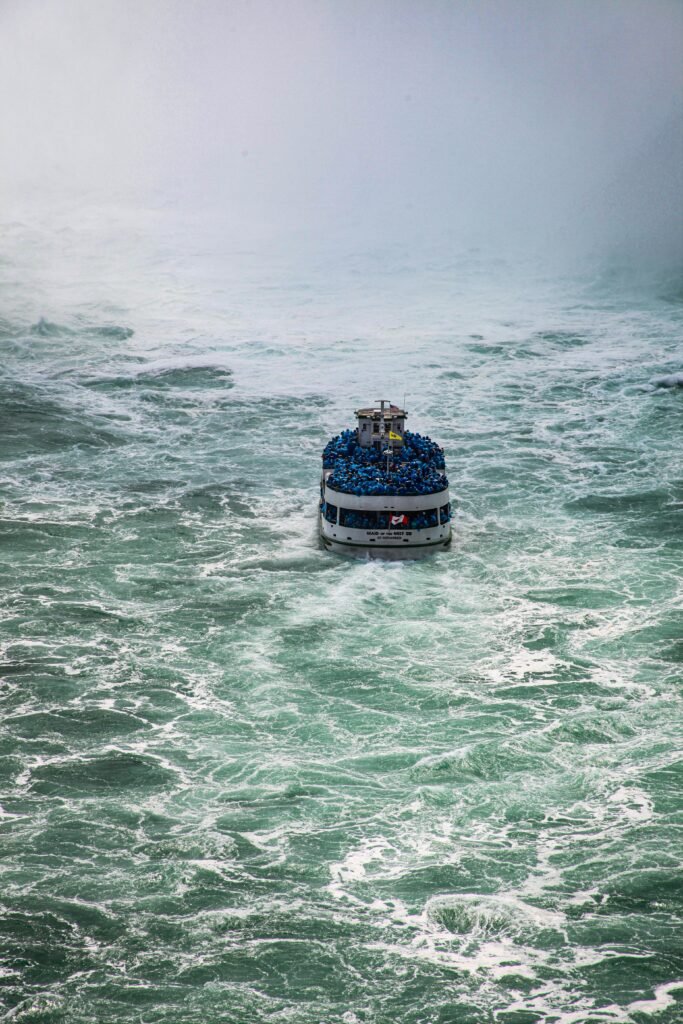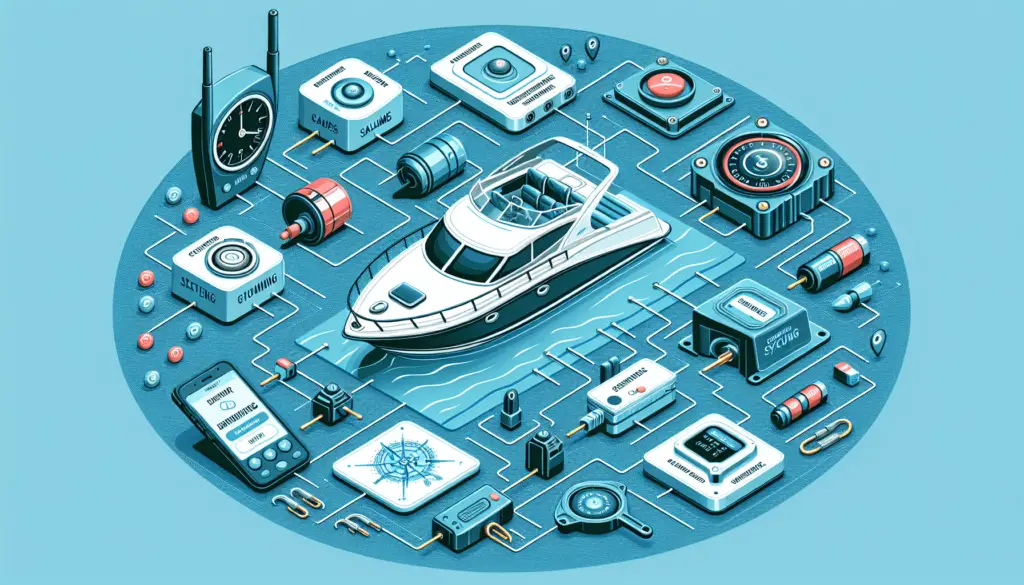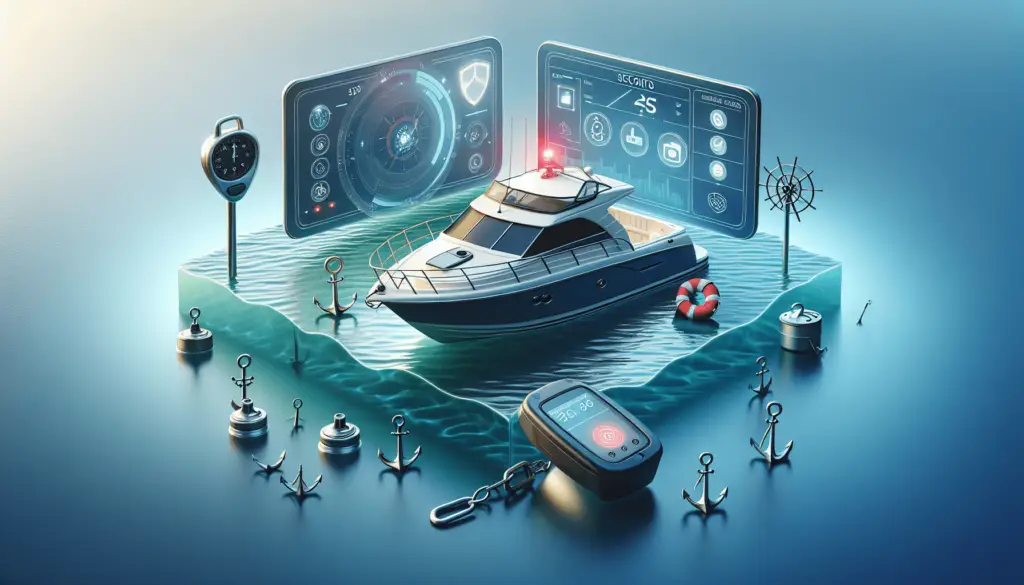Whether you’re a seasoned sailor or just starting out, ensuring the security of your boat is crucial. With the rising instances of boat thefts and break-ins, it’s important to take proactive steps to upgrade your boat’s security system. In this beginner’s guide, we will explore some practical and effective measures that you can take to protect your investment and enjoy peace of mind on the water. From installing surveillance cameras to using smart locks and alarms, we’ll provide you with all the essential tips and tricks to upgrade your boat’s security system. So, let’s dive in and make sure your boat stays safe and secure!

Assessing Your Current Security System
Evaluate your existing security measures
Before you can begin upgrading your boat’s security system, it’s important to start by assessing your current security measures. Take a close look at what security measures you currently have in place, such as locks, alarm systems, or surveillance cameras. Evaluate their effectiveness and determine if any upgrades or improvements are needed.
Identify potential vulnerabilities
Next, identify potential vulnerabilities in your boat’s security. Are there any weak points that could be easily exploited by thieves or intruders? This could include unsecured hatches or windows, outdated locks, or a lack of surveillance in certain areas. By identifying these vulnerabilities, you can work towards addressing them and improving the overall security of your boat.
Consider the specific security needs of your boat
Each boat has its own unique security needs, so it’s important to consider the specific requirements of your vessel. Factors such as the size of your boat, its location, and the type of equipment or valuables onboard should all be taken into account. By understanding your boat’s specific security needs, you can make informed decisions when choosing the right security system.
Choosing the Right Security System
Research different types of security systems
With advancements in technology, there are now various types of security systems available for boats. Research different options such as alarm systems, GPS tracking devices, and video surveillance cameras. Each system has its own advantages and features, so it’s important to familiarize yourself with the options to make an informed decision.
Consider your budget
When choosing a security system, it’s crucial to consider your budget. Determine how much you’re willing to invest in upgrading your boat’s security and set a realistic budget. Keep in mind that while some systems may have a higher upfront cost, they may offer greater security and peace of mind in the long run.
Evaluate the features and capabilities of each system
Once you have narrowed down your options, carefully evaluate the features and capabilities of each security system. Consider factors such as the range of the alarm system, the accuracy of GPS tracking, and the quality of video surveillance. Take into account your boat’s specific security needs and choose a system that best meets those requirements.
Electronic Security Measures
Install an alarm system
One of the most effective ways to enhance your boat’s security is by installing an alarm system. These systems can detect unauthorized entry and alert you immediately. Look for an alarm system specifically designed for boats, as they are equipped to withstand marine environments and can be easily integrated into your boat’s existing electrical system.
Implement GPS tracking
GPS tracking devices have become increasingly popular for boat security. These devices allow you to track the location of your boat in real time, which can be extremely helpful in case of theft or unauthorized use. Choose a GPS tracking device that offers features such as geofencing and remote monitoring for added security.
Consider video surveillance options
Video surveillance cameras can provide an extra layer of security for your boat. They can deter potential thieves and provide valuable evidence in case of a security breach. Look for weatherproof cameras that offer high-resolution video and remote viewing capabilities. Consider placing cameras in strategic locations such as entry points or areas where valuable equipment is stored.
Physical Security Measures
Install sturdy locks and deadbolts
To strengthen the physical security of your boat, ensure you have sturdy locks and deadbolts installed on all entry points. High-quality marine-grade locks are designed to withstand harsh marine environments and are more resistant to tampering. Make sure all locks are in good working condition and replace any that are worn or damaged.
Consider using a dock lock or wheel clamp
If your boat is docked for extended periods, consider using a dock lock or wheel clamp to prevent unauthorized movement. These additional physical security measures can act as a deterrent and make it more difficult for thieves to steal your boat. Choose locks or clamps that are specifically designed for use on boats and are suitable for the size and type of your vessel.
Secure hatches and windows
Don’t overlook the importance of securing hatches and windows on your boat. These can be potential entry points for thieves or intruders. Install sturdy latches or locks on all hatches and consider adding security film or burglar-resistant glass to windows. Regularly check all seals and weather stripping to ensure they are in good condition and replace any that are deteriorating or damaged.

Access Control Systems
Implement a keyless entry system
Upgrading to a keyless entry system can greatly enhance the security of your boat. These systems use electronic key fobs or proximity cards instead of traditional keys, making it more difficult for unauthorized individuals to gain access to your boat. Look for keyless entry systems specifically designed for boats, as they are more resistant to water damage and can be easily integrated into your boat’s electrical system.
Consider biometric authentication systems
For even greater security, consider implementing biometric authentication systems onboard your boat. These systems use unique biological characteristics such as fingerprints or iris scans to grant access. Biometric authentication provides an additional layer of protection as it is difficult to replicate or forge. However, keep in mind that biometric systems may be more expensive than other access control options.
Install an intercom or video doorbell
Installing an intercom or video doorbell system can allow you to communicate with visitors before granting them access to your boat. This provides an additional level of security by allowing you to verify the identity of individuals before they board. Look for systems that provide clear audio and video quality, and ensure they are properly waterproofed for marine use.
Alarm Monitoring Services
Research alarm monitoring companies
If you want an extra layer of protection for your boat, consider subscribing to an alarm monitoring service. These services provide 24/7 monitoring of your boat’s security system and can quickly alert authorities in case of a security breach. Research reputable alarm monitoring companies that specialize in boat security to ensure reliable and effective service.
Choose a service plan
When selecting an alarm monitoring service, choose a service plan that suits your specific needs. Consider factors such as response time, the frequency of system checks, and the level of customer support provided. Be sure to read the terms and conditions of the service plan thoroughly to fully understand what is included.
Ensure effective communication with the monitoring center
To ensure effective communication with the monitoring center, make sure that your boat’s security system is properly connected and configured. Test the system regularly to ensure it is functioning correctly and that signals are being transmitted accurately. Maintain open lines of communication with the monitoring center and provide any necessary updates or changes to contact information.

Fire and Gas Detection
Install smoke and carbon monoxide detectors
Fire and gas detection systems are crucial for the safety of both your boat and its occupants. Install smoke detectors and carbon monoxide detectors in key areas of your boat such as sleeping quarters and galley areas. Opt for detectors that are specifically designed for marine use, as they are more resistant to moisture and adverse environmental conditions.
Consider a gas leak detection system
If your boat uses gas-powered appliances or a propane system, consider installing a gas leak detection system. These systems can detect leaks before they become a safety hazard. Choose a system that provides audible and visual alerts and ensure it is regularly maintained and tested to ensure proper functionality.
Ensure proper maintenance and testing
Regular maintenance and testing of your boat’s fire and gas detectors are essential for reliable operation. Follow the manufacturer’s guidelines for maintenance and test the detectors regularly to ensure they are functioning correctly. Replace any faulty or expired detectors promptly and keep spare batteries or replacement parts on board.
Anti-Theft Devices and Techniques
Install a boat tracking device
A boat tracking device can be a valuable asset in case your boat is stolen. These devices use GPS technology to track the location of your boat, allowing law enforcement to recover it quickly. Look for a tracking device that offers real-time tracking and geofencing capabilities. Make sure the tracking device is properly installed and concealed to prevent tampering.
Utilize visible deterrents such as signage
Visible deterrents can help deter potential thieves from targeting your boat. Place signage prominently on your boat’s exterior, indicating that it is protected by a security system or CCTV cameras. This can make thieves think twice before attempting to break into your boat, as they will not want to risk being caught on camera or triggering an alarm.
Remove valuable items when not in use
When your boat is not in use, it’s important to remove valuable items and equipment from it. Thieves are more likely to target boats that have visible valuables on board. Remove electronics, jewelry, fishing gear, and any other valuables before leaving your boat unattended. Store them securely in a locked compartment or take them with you.

Securing Electronic Systems
Protect against cyber threats
As technology becomes more integrated into boats, it’s crucial to protect your electronic systems from cyber threats. Use strong, unique passwords for all your boat’s electronic devices and change them regularly. Avoid connecting to unsecured Wi-Fi networks and consider using a virtual private network (VPN) for added security.
Update software and firmware regularly
Ensure that all software and firmware used on your boat’s electronic systems are up to date. Manufacturers often release updates to address security vulnerabilities, so it’s important to apply these updates promptly. Regularly check the manufacturer’s website or contact customer support to stay informed about any new updates or patches.
Consider employing encrypted communication channels
If you need to transmit sensitive information from your boat, consider using encrypted communication channels. Encrypted communication can help protect your information from interception and unauthorized access. Use secure messaging apps or implement encryption protocols such as SSL/TLS when transmitting data over the internet.
Regular Security Maintenance
Perform routine inspections and maintenance
To maintain the effectiveness of your boat’s security system, perform routine inspections and maintenance. Regularly check all locks, alarm sensors, surveillance cameras, and access control systems to ensure they are functioning properly. Test all security measures regularly to identify any issues or malfunctions and address them promptly.
Train all boat occupants on security protocols
Ensure that all occupants of your boat, including crew members and guests, are trained on the boat’s security protocols. This includes proper use of the security system, emergency procedures, and how to identify suspicious activities. Regularly review security protocols with everyone on board and encourage open communication about security concerns.
Stay up to date with the latest security advancements
Lastly, stay informed and up to date with the latest advancements in boat security. Technology is constantly evolving, and new security measures and products are being introduced regularly. Subscribe to boating and security-related publications, follow reputable websites or blogs, and attend conferences or seminars to stay informed about the latest security trends and advancements.
By following these steps and implementing the recommended security measures, you can greatly enhance the security of your boat. Remember, investing in a comprehensive security system is not only about protecting your valuable assets but also ensuring the safety and peace of mind of everyone on board.


